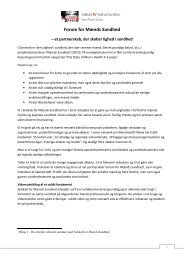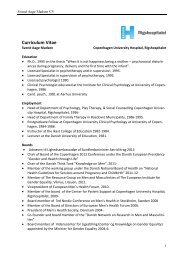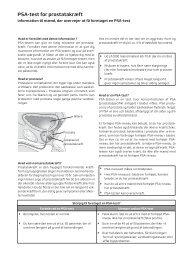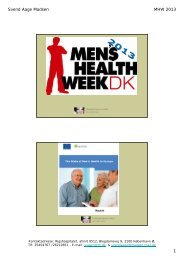Untitled
Untitled
Untitled
You also want an ePaper? Increase the reach of your titles
YUMPU automatically turns print PDFs into web optimized ePapers that Google loves.
Accessing Health Services<br />
Main Points<br />
• Infrequent use of and late presentation to health services are associated<br />
with men experiencing higher levels of potentially preventable health<br />
problems and having reduced treatment options.<br />
• The overall rate of admission to hospital is higher for men than for women<br />
for all of the principal diseases and health problems.<br />
• Men are also less likely than women to engage in routine or preventative<br />
health checks.<br />
• Men’s poorer knowledge/awareness of health points towards the need for<br />
targeted health information to be delivered to men.<br />
• Men’s preference for the internet as an alternative to mainstream medical<br />
services can create the problem of missed diagnosis and the possibility of<br />
accessing potentially dangerous counterfeit drugs.<br />
Summary<br />
Men’s usage of health services has been long recognised as a possible<br />
contributing factor in their high rate of premature morbidity and mortality.<br />
There is evidence that some men use primary health services less frequently<br />
and are more likely to need hospitalisation for the principal causes of disease.<br />
There is also evidence that men do not use preventative services at the same<br />
level as women, which may be due to the availability of services only being<br />
available during the working day so inaccessible to many men. Men have<br />
higher levels of usage of the internet for health advice and are more likely to<br />
buy drugs through this route (and therefore more vulnerable through missed<br />
diagnosis and the rise of counterfeit drugs). Conversely men tend to show<br />
no difference to women with regard to presenting with symptoms of illness.<br />
Where services have been set up in ways that make access easier, then men<br />
have used them and many have been shown to have high levels of hidden<br />
problems, both physical and emotional.<br />
Against a background of higher premature death rates among men for nearly<br />
the whole range of non-gender specific disease and illness, there is an urgent<br />
need for more targeted measures that enable boys and men to recognise<br />
their health risks and to take increased responsibility for managing their own<br />
health.<br />
There is a need for the provision of training for GP’s and other healthcare<br />
professionals on the gendered aspects of health and illness and, in particular,<br />
on best practice in engaging men with health services. There also needs to<br />
9








